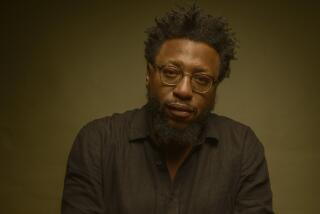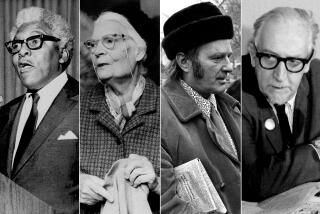David McReynolds, gay socialist pacifist who twice ran for president, dies at 88
- Share via
For more than three decades, David McReynolds was among the most outspoken socialists and pacifists in America, a leftist organizer who combined a belief in wealth redistribution with a fierce opposition to the Vietnam War and nuclear weapons.
As a leader of the War Resisters League, he spurred a wave of antiwar demonstrations in 1965, when he joined four other men in lighting their draft cards on fire, defying a federal law that could have sent him to prison for five years and earned him a $10,000 fine.
He went on to become one of the first candidates to come out as gay to run for Congress and president. Although he never came close to winning office, he helped “define modern pacifism in the United States,” said his friend Bruce Cronin, chair of the political science department at the City College of New York.
McReynolds, who died Friday at 88 at a hospital in Manhattan, drew the attention of the FBI and landed in jail several times as a result of his activism. His political career was all the more remarkable given his upbringing in Los Angeles, where he was raised by a family of conservative Baptists and joined the Prohibition Party in his youth.
Though he came to don tie-dye shirts, beads and patchouli cologne with other Vietnam-era peaceniks, he honed his public speaking skills with a group called the Traveling Temperance Talking Team, in which sharply dressed teenagers competed to see who could best denounce the evils of alcohol.
Indeed, McReynolds was described as more professorial than proletarian, with interests that ranged far beyond political rallies and campaigns. He was a prolific photographer, taking more than 50,000 pictures of New York City streetscapes and activists such as the gay civil rights leader Bayard Rustin (whom McReynolds described as a mentor) and the pacifist A.J. Muste (for whom he worked as a top lieutenant).
McReynolds was also a member of the Bromeliad Society, an international botanical group, and filled his East Village apartment with tropical plants and hundreds of bottles of perfume, which he created himself and arranged on floor-to-ceiling shelves. He was found unconscious in the apartment Wednesday, several weeks after suffering a fall, said his younger brother, Martin McReynolds.
Active in the anti-Korean War and civil rights movements, McReynolds joined the War Resisters League in 1960 and was soon named field secretary. Alongside Norma Becker and Sidney Peck, he became a behind-the-scenes architect of the anti-Vietnam War movement, Cronin said, known for maintaining unity in a coalition that included members of the political left and right.
“If you can bring together labor, teachers, students, folks from all walks of life, then you can turn the country. That’s painstaking work,” said Cronin, who met McReynolds while preparing for a 1982 nuclear disarmament rally that, by some estimates, drew 1 million people to Central Park.
“It took somebody like David to bring people together and say, ‘Look, let’s keep the focus on what we want and not break up over trifles.’”
Among the league’s most controversial actions was the burning of draft cards. McReynolds made national headlines when he appeared on a wooden platform in Manhattan’s Union Square to burn his card on Nov. 6, 1965, amid counterprotests from a group chanting, “Drop dead, red.”
The burning was interrupted, the New York Times reported, when a man sprayed McReynolds and his fellow demonstrators with a fire extinguisher: “The pacifists managed to dry the cards over the flame of a cigarette lighter, however, and the cards burned crisply.”
At 36, McReynolds was the oldest member of the group, which included Tom Cornell, Marc Paul Edelman, Roy Lisker and James Wilson. While the others were indicted on charges of defacing their cards (three were sentenced to six months in prison), McReynolds was left alone, reportedly because he was too old to be drafted.
He went on to coordinate antiwar rallies across the country and twice met with dissident groups in Vietnam. According to “A Saving Remnant,” a biography of McReynolds by Martin Duberman, he was visiting Czechoslovakia when the Soviets invaded in 1968 to quash the Prague Spring.
McReynolds — who said he was a socialist, not a communist — was able to return to the United States in time to run for a U.S. House seat that fall, on Eldridge Cleaver’s Peace and Freedom ticket. As in 1958, during his first bid for Congress, he was crushed, receiving just 5% of the vote.
Undaunted, he went on to run for president with the Socialist Party USA in 1980, on a platform that called for nuclear disarmament, the breakup of large corporations and sharp reductions in military spending.
“We have no illusions that we will win the presidential election,” he said after a rally with his running mate Diane Drufenbrock, a nun. “Our purpose is to make possible a discussion of socialism and to raise issues on foreign policy and unemployment.”
McReynolds received fewer than 7,000 votes. He ran once more, in 2000, and four years later mounted a Green Party campaign for the U.S. Senate seat held by Democrat Charles E. Schumer of New York.
In part, he said, his electoral defeats could be chalked up to an imaging problem in a country where “socialism” has long been a dirty word.
“One of the tragedies is that the things a Socialist candidate will say are things that really could be said by a compassionate and moderately insightful Republican,” he told the Progressive magazine in 2000. “If I say we should have much greater mass transit in the major cities, that we should be able to rebuild the railroad system so that Amtrak actually connects all the small towns, that’s a reasonable thing. It’s not a radical proposal.”
David Ernest McReynolds was born in Los Angeles on Oct. 25, 1929, one day after the Black Thursday stock market crash signaled the beginning of the Depression.
He described his leftward political turn as “probably a Freudian rebellion against my father,” a journalist and advertising salesman for McGraw-Hill who served in the Air Force Reserve.
At UCLA, where he received a bachelor’s degree in 1953, he entered what he called a “cabal of radicalism,” joining a group of young socialists who danced the hora, listened to Edith Piaf records and published a leftist newspaper on campus. He said he also had a “liberating” sexual encounter around that same time, with choreographer Alvin Ailey.
In 1969, McReynolds wrote an article for WIN, the War Resisters League magazine, that marked his “coming out” in professional life. But he said that he never identified as a gay rights advocate, and when running for president in 1980, decided that his identity as a socialist pacifist was “complex enough.”
McReynolds moved to New York in 1956 and worked for the left-leaning magazine Liberation before joining the War Resisters League. He later served as chairman of War Resisters’ International, and formally retired from the league in 1999.
In 2015, he resigned from the Socialist Party after being censured for Facebook comments that the party deemed “potentially racist” and Islamophobic. (McReynolds said that his remarks about the “thuggish” behavior of Michael Brown, whose shooting sparked riots in Ferguson, Mo., had been misunderstood, and that he was “absolutely opposed to efforts to demonize Muslims.”)
In addition to his brother of Santa Rosa, Calif., survivors include a sister, Elizabeth Gralewski of Santa Barbara.
In 2000, 25 years after the end of the Vietnam War, McReynolds told the New York Times that he feared the war and its accompanying protests had “sunk into a memory hole,” and recalled that the period was a harrowing time for him as well as the country. He had turned from teetotalling to alcoholism, he said, but stopped drinking around the time the war ended.
“From one point of view,” he said, “it was a wonderful time — to feel that you were doing something, or that you shortened the war by one day, or saved one life on either side. To some extent, we did that.”
Smith writes for the Washington Post.
More to Read
Start your day right
Sign up for Essential California for the L.A. Times biggest news, features and recommendations in your inbox six days a week.
You may occasionally receive promotional content from the Los Angeles Times.







